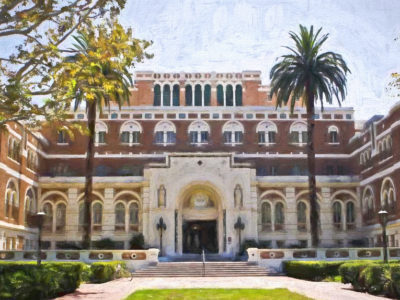In the twisted world of Critical Race Theory, impartial grading is considered tantamount to a hate crime. UCLA Accounting Professor Gordon Klein found this out the hard way, when he refused a request to grade black students with more leniency in the wake of George Floyd’s death.
Shortly after Floyd’s death in May 2020, Prof. Klein, who teaches at UCLA’s Anderson School of Management, received an email—from a non-black student—expressing concern that both COVID-19 and Floyd’s death had disproportionately impacted black students in his class.
“As we approach finals week, we recognize that these conditions will place Black students at an unfair academic disadvantage due to traumatic circumstances out of their control,” stated the student’s email. “We implore you to mandate that our final exam is structured as noharm, where they will only benefit students’ grades if taken,” the letter continues. “In addition, we urgently request shortened exams and extended deadlines for final assignments and projects.”
Professor Klein, who takes his academic responsibilities seriously, responded to the student’s request:
Thanks for your suggestion in your email below that I give black students special treatment, given the tragedy in Minnesota. Do you know the names of the classmates that are black? How can I identify them since we’ve been having online classes only? Are there any students of mixed parentage, such as half black-half Asian? What do you suggest I do with respect to them? A full concession or just half? Also, do you have any idea if any students are from Minneapolis? I assume that they probably are especially devastated as well. I am thinking that a white student from there might possibly be even more devastated by this, especially because some might think that they’re racist even if they are not. My TA is from Minneapolis, so if you don’t know, I can probably ask her. Can you guide me on how I should achieve a “no-harm” outcome since our sole course grade is from a final exam only? One last thing strikes me: Remember that MLK famously said that people should not be evaluated based on the “color of their skin.” Do you think that your request would run afoul of MLK’s admonition?”
Displaying great maturity, the student who had emailed Klein to request the change in grading proceeded to apologize for her email, but the matter did not end there. A screenshot of Klein’s response was circulated on the campus and university officials were incensed at his lack of sensitivity for minority students.
Anderson School of Management Dean Antonio Bernardo issued an apology “for the very hurtful sentiments expressed in this message,” adding ironically that “respect and equality for all are core principles at Anderson.” Dean Bernardo also called Klein’s email “outrageous and simply inexcusable,” and said the university “reject[s] racism and violence” and was “investigating the situation and plan to address it.”
Only in the bizarro world of Critical Race Theory could Prof. Klein’s refusal to use racially-biased grading standards be viewed as a rejection of “equality” or an instance of “racism and violence.”
Mob rule initially prevailed at UCLA. Over 20,000 people signed a petition urging that Klein be fired and he was placed on mandatory leave by the university and suspended from teaching his classes. All because he refused to enact more lenient grading practices for minority students—a clear violation of federal civil rights law and, if allowed to occur, an egregious exercise of racism. UCLA absurdly claimed that it was the “tone” of Klein’s email that merited the investigation and suspension, not his suggestion that racially-biased grading would be unfair and ridiculous.
Ultimately, common sense and the law prevailed, and Klein was reinstated as a professor after UCLA’s Discrimination Prevention Office ruled that there was no basis for the complaint. But the suspension and the negative publicity surrounding it have had a lasting impact on Klein’s career. In September 2021, Klein filed a lawsuit against the Anderson School of Management alleging that he has suffered significant financial and reputational damage due to the university’s witch-hunt.
“UCLA is a public institution, legally bound to respect student and faculty First Amendment rights,” explained the Foundation for Individual Rights in Education, a non-profit organization that supported Klein in his battle to regain his position. “The First Amendment and UCLA policy protect Klein’s academic freedom rights, including the right to manage the content and direction of his course and comment on matters of public concern.”
UCLA’s horrendous treatment of Prof. Klein for his refusal to institute racially-biased grading standards is an egregious example of CRT at work.


 University of Florida
University of Florida
Leave a Reply